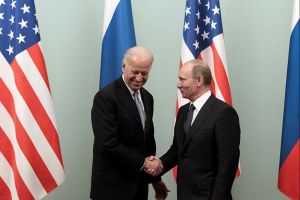A joint Chicago Council on Global Affairs and the Levada Analytical Center survey shows few Russians or Americans expect great changes to US-Russia ties now or in the next 10 years, although both publics see the merits of collaboration.
According to a January–February 2021 joint survey by the Chicago Council on Global Affairs and the Levada Analytical Center in Moscow, neither Russians nor Americans expect the new US administration to prompt a reset in bilateral relations. While many Russians have yet to form an opinion of US President Joseph Biden, few in either country expect great changes to US-Russia ties now or even in the next 10 years. Despite this anticipated stasis, both publics acknowledge the importance of bilateral cooperation on a number of long-term foreign policy issues.
Key Findings
- Russians are now only slightly more likely to say they have a negative (43%) than a positive (39%) opinion of the United States. Over the past two years, negative views have declined significantly.
- Asked to rate their feelings toward Russia on a zero-to-100 scale, Americans give Russia an average of 29, the lowest reading since 1982.
- Expectations for an improvement in US-Russian relations during the Biden presidency are slim: about four in ten Americans (43%) and Russians (42%) expect relations to remain the same, while four in ten Americans (44%) and three in ten Russians (29%) expect them to worsen.
- Despite pessimistic views about the bilateral relationship, Americans and Russians think it is essential the countries cooperate on several issues, including preventing Iran and North Korea from developing nuclear weapons and limiting the buildup of nuclear weapons in Russia and the United States.
- Nearly half of Russians (47%) are unfamiliar with Biden; of the rest, 19 percent have a positive view and 35 percent hold a negative opinion. Nearly nine in ten Americans (87%) express an unfavorable view of Russian President Vladimir Putin (11% positive).
Russians Grow Less Negative toward the United States
According to a recent headline in Foreign Affairs, “Russia Will Never See the United States the Same Way Again” after four years of the Trump administration and the January 6 mob attack of the US Capitol building diminished US international standing.1 But according to the recent joint Chicago Council-Levada survey, Russians’ opinions of the United States are more favorable than they have been in recent years. A plurality of Russians still has a negative view of the United States (43%), but nearly as many now say they have a positive view (39%). In fact, the current readings are among the least negative toward the United States since before the fallout between Moscow and Washington after the 2014 crisis in Crimea and Ukraine. In the past two years, the difference between positive and negative views has narrowed significantly to the point where they almost resemble pre-Crimea readings. As Biden begins to confront Russia with newly announced sanctions, however, Russian sentiments may change.
- 1
To read about American opinion on the January 6 attacks and US influence, see Dina Smeltz and Brendan Helm, Americans Expect Temporary Drop in US Influence Due to Capitol Attack, Chicago Council on Global Affairs, February 9, 2021.
Russian Attitudes Toward the United States
In general, what is your attitude toward the United States? (%)
Source:
January 29-February 2, 2021 | n = 1,616
Levada Analytical Center
Russians have also tempered their perceptions of US respect in the world. Slightly more now (33%) than in 2019 (28%) say the United States is respected about as much as 10 years ago. Currently, 46 percent of Russians say that compared to 10 years ago, the United States is less respected, down from 53 percent in 2019. One in ten (9%) continue to say the United States is respected more.
Americans, Russians Agree US Respected Less
Do you think the United States is respected more in the world today than it was 10 years ago, respected less, or respected about as much now as 10 years ago? (%)
Source:
January 29-February 2, 2021 | n = 1,616
Levada Analytical Center
Those Russians who have heard something about the January 6 attack of the US Capitol by supporters of President Donald Trump (58% overall) are somewhat more likely than others to say the United States has lost respect (55%). These informed Russians are also more likely to say the events of January 6 show the American political system is in crisis (53%) relative to those who haven’t heard anything about it (30%).2
Strikingly, Russians are less critical toward the United States than Americans are. More Americans (67%) than Russians say the United States is respected less compared to a decade ago. In fact, this represents the largest proportion of Americans who say the United States has lost respect since 1982 (when 65% said the United States was respected less.3 Americans also say the mob attack on January 6 has a negative effect on US influence in the world (61%), but mostly a temporary one (46%).4
Americans Grow More Negative toward Russia since 2019
While Russian attitudes toward the United States are now less downbeat, American opinion has gone in the other direction. When asked to rate their feelings on a thermometer scale, with 100 meaning a very warm, favorable feeling and zero meaning a very cold, unfavorable feeling, Americans give Russia an average rating of 29—the lowest reading recorded in Chicago Council surveys since the final years of the Cold War. Feelings toward Russia have been moving consistently downward since 2002 and have remained especially low in the years since the annexation of Crimea in 2014 and Russian interference in the 2016 elections.
- 2
Asked what they think of the political unrest in the United States, 43 percent of Russians say it is a sign of crisis in the United States, 42 percent say it is a normal process, and 15 percent say they don’t know.
- 3
Nineteen percent of Americans say the United States is respected as much as 10 years ago, and 12 percent say it is respected more.
- 4
For more on US attitudes toward the January 6 attack, see Smeltz and Helm, Americans Expect Temporary Drop.
American Sentiment toward Russia
Please rate your feelings toward some countries and peoples, with 100 meaning a very warm, favorable feeling, 0 meaning a very cold, unfavorable feeling, and 50 meaning not particularly warm or cold. You can use any number from 0 to 100; the higher the number the more favorable your feelings are toward that country or those people. (mean)
Source:
July 2-19, 2020 | n = 2,111
Chicago Council Surveys
Identical to results in 2018, half of Americans (51%) say Russia is less respected today than it was 10 years ago. Slightly more (36%) than in 2018 (31%) say Russia is respected about as much as 10 years ago. And fewer than in 2018 say Russia is respected more (9% versus 16% in 2018). Americans have also grown less likely to say Russia is important to the United States. About six in ten Americans (58%) say so, down from 71 percent in 2010 and 76 percent in 2008.
For their part, Russians also sense that international respect for their country has declined. A plurality still say Russia is respected more (42%), but this has slipped from survey results two years ago, when 55 percent said the same. About as many now say Russia has lost respect (26%) as say it is as respected as it was 10 years ago (27%). This decline may be due to diminishing power of the “Crimea effect.”5 After Russia annexed Crimea in 2014, Russian pride in this achievement led to increased favorable ratings of Russian authorities, state institutions, and Putin.6 But in recent years, the Russian public has turned inward and begun to focus on domestic issues.
- 5
For example, see Dina Smeltz and Lily Wojtowicz, Russians Say Their Country Is a Rising Military Power; And a Growing Percentage of Americans View Russia as a Threat, Chicago Council on Global Affairs, March 21, 2019.
- 6
Data from the Levada Analytical Center shows that following the events in Crimea in February 2014, there was a sustained increase in approval for Putin and positive assessments of the situation in the country. Additionally, when asked about events in Russian history that made them proud in September 2020, 30 percent of Russians chose the annexation of Crimea, down from 45 percent in December 2018.
Americans Say Russia Respected Less, Russians Disagree
Do you think Russia is respected more in the world today than it was 10 years ago, respected less, or respected about as much now as 10 years ago? (%)
Sources:
January 29-February 1, 2021 | n = 1,021
Chicago Council Surveys
January 29-February 2, 2021 | n = 1,616
Levada Analytical Center
Few Russians or Americans Expect Improvement in Bilateral Relations
Given Biden’s experience with Putin, his approach toward Moscow will not include resetting relations like several past presidential administrations. According to the White House, Biden’s first presidential call to Putin in January 2021 included his concerns over the SolarWinds hack—a massive cyberattack against US government agencies and private businesses that US intelligence has blamed on Russia—the poisoning and imprisonment of Russian opposition leader Alexei Navalny, and reports of Russian bounties on US soldiers in Afghanistan. On March 2, Biden imposed sanctions against Russia in coordination with the European Union in response to treatment of Navalny.7 Administration officials have said further penalties would be imposed in the next few weeks as retaliation for the SolarWinds hack.
Survey data suggest that Russians will not be surprised by these new sanctions. According to the Chicago Council-Levada Center survey, few Russians expect the US diplomatic and economic sanctions placed against Russia to be loosened during the Biden presidency (13%). A majority of the Russian public thinks the sanctions will remain in place (35%) or be tightened (36%).
More broadly, relatively few Russians predict the US-Russia relationship will improve even within the next 10 years. Just two in 10 (19%) say the countries will grow closer. More believe US-Russia relations will remain the same as they are now (42%) or the two countries will grow further apart (29%) in the next decade. In a January 2020 Levada survey, just 12 percent of Russians believed that US-Russia relations would improve under the Biden administration, compared to 46 percent who expected improvement under Trump in 2017.
Americans are similarly pessimistic. Most Americans split between those who believe the two countries will grow further apart (43%) and those who say relations will remain as they are now (44%). Just one in 10 Americans (10%) says the United States and Russia will grow closer. And only 16 percent expect Russian-American relations to improve under the Biden presidency. A majority expect relations between Russia and the United States will either worsen (46%) or stay the same as now (36%).
- 7
Though US intelligence officials blame the Kremlin for Navalny’s August 2020 poisoning, Levada polling shows that most Russians are not convinced that the Russian government is to blame. For more, see Dina Smeltz, Brendan Helm, Denis Volkov, and Stepan Goncharov, In Russia, Navalny Inspires Respect for Some, Indifference for Most, Chicago Council on Global Affairs, February 22, 2021.
US-Russian Relations in the Next 10 Years
US: “Over the next ten years, how do you think the relationship between United States and the following countries will change?” (%) Russia
Russia: “Over the next ten years, do you think that Russia and The United States will grow closer together, further apart or that relations will remain as they are now?” (%)
There is a partisan dimension to the question of US-Russia relations during the Biden administration. Nearly two-thirds of Republicans (64%) but only one-third of Democrats (34%) believe the bilateral relationship will worsen during the Biden presidency. Democrats are more likely than Republicans to expect relations to remain the same (38% of Democrats, 24% of Republicans). This divide seems more indicative of Republican views toward Biden than Republican views toward Russia. Republicans and Democrats agree on major Russia policy questions, including shared support for imposing sanctions against Moscow for the SolarWinds breach (72% of Republicans, 83% of Democrats) and for participating in the New START treaty (65% of Republicans, 81% of Democrats).8 And there is minimal difference in partisan assessments of the future state of US-Russian relations.
Majorities View Cooperation as Essential
Despite large portions of Russians and Americans having rather pessimistic projections for US-Russian relations and negative views of the other nation’s leader, strong majorities of both Americans and Russians say it is essential for the two countries to cooperate on key international initiatives.
Given the worldwide preoccupation at the moment on the coronavirus pandemic, Russians are more likely to say cooperating to confront and prevent future pandemics is essential (82%), while nearly two-thirds of Americans agree (63%). Majorities of both Americans (52%) and Russians (60%) also say it is essential to work together on the global challenge of limiting the effects of climate change.
Yet Americans are especially interested in US-Russia cooperation on preventing nuclear proliferation. Seven in 10 Americans and Russians each say it is essential to prevent a nuclear arms race between the two countries. Large majorities of both Americans (73%) and Russians (80%) have expressed support for participating in or extending the New START Treaty.9 And seven in 10 Americans and six in 10 Russians also say it is essential for the two countries to work together to prevent Iran and North Korea from developing a nuclear weapons capability.10
The idea of an international treaty between Russia and the United States to address cyberattacks may seem infeasible given Russia’s interference in the 2016 US presidential election and, more recently, the SolarWinds cyberattack. But majorities in both countries say it is essential that they work together on signing an international agreement to refrain from using cyberattacks against other countries (54% of Americans, 62% of Russians).
The greatest divergence in preferences for cooperation is on managing China’s influence. Only a minority of Russians (37%) see a need to work with the United States to manage China’s international influence, reflecting Russians’ positive views of China and perceptions of Beijing as a partner to Moscow (84% in 2019).11 Just more than half of Americans (53%) say it is essential for the United States and Russia to cooperate on managing China’s rise, pointing toward growing perceptions among Americans that China is a critical threat.
- 8
For more on American preferences for a response to the SolarWinds attack, see Dina Smeltz and Brendan Helm, Solar Winds Hack: Americans Prefer Sanctions over Retaliatory Cyberattack against Russia, Chicago Council on Global Affairs, February 11, 2021. For more on attitudes toward New Start, see Dina Smeltz and Brendan Helm, Russians and Americans Welcome Extension of New Start Treaty, Chicago Council on Global Affairs, February 19, 2021.
- 9
For Americans, 73 percent overall said the United States should participate in the New START treaty, including majorities of Republicans, Democrats, and Independents. Similarly, for Russians, a strong majority either strongly (56%) or somewhat (24%) supports extending the treaty.
- 10
Asked about the Iran nuclear deal, 57 percent of Americans said the United States should participate, and Russia has publicly expressed its desire for the United States to rejoin the deal.
- 11
See Dina Smeltz, Brendan Helm, Denis Volkov, and Stepan Goncharov, Russians See Greater Reward than Risk in Relations with China, Chicago Council on Global Affairs, March 10, 2021.
Areas of US-Russian Cooperation
US: How great a priority is it for the United States and Russia to work together on the following issues: (% it is essential)
Russia: How great a priority is it for the United States and Russia to work together on [x]? (% it is essential)
KEY
A: Preventing Iran from developing nuclear weapons capability
B: Preventing North Korea from developing nuclear weapons capability
C: Limiting the buildup of nuclear weapons in both countries
D: Working together to confront and prevent future pandemics
E: Signing an international agreement to refrain from using cyberattacks against other countries
F: Negotiating conventional arms control agreements
G: Managing China's influence in the world
H: Limiting the effects of climate change
Sources:
January 29-February 1, 2021 | n = 1,021
Chicago Council Surveys
January 29-February 2, 2021 | n = 1,616
Levada Analytical Center
There are some partisan differences on these priorities, reflecting varying weight that Democrats and Republicans assign to potential threats. Democrats are much more likely than Republicans to say it is essential to cooperate with Russia on limiting the effects of climate change (75% Democrats, 25% Republicans) and negotiating conventional arms control agreements (65% Democrats, 41% Republicans). Republicans are more likely to say it is essential to cooperate on managing China’s influence (70% Republicans, 46% Democrats).
Biden a Relative Unknown to Russians; Americans Negative toward Putin
While the Kremlin knows Biden from the Obama presidency, many everyday Russians have yet to become familiar with him. When asked whether they have a favorable or unfavorable view of the new American president, nearly half of Russians (47%) say they don’t know, perhaps indicating that Biden has yet to make an impression in Russia. Of the rest, 19 percent express a favorable view while just over a third (35%) have unfavorable views.
Although many Russians were initially hopeful that US-Russia relations would improve under the Trump administration, currently more Russians have a negative (49% unfavorable) than positive opinion of the former US president (25% favorable).
For their part, a majority of Americans continue to express unfavorable views of Putin. Nearly nine in 10 (87%) Americans say they have a somewhat (31%) or very (56%) unfavorable view, a slight increase from when this question was last asked in 2018 (83% net unfavorable).12 Republicans have similarly favorable views of Putin (18%) and Biden (15%). This harkens back to results from a 2017 Economist/YouGov survey in which Republicans gave higher ratings to Putin than to then-President Barack Obama.
- 12
Two-thirds of Russians have a somewhat (38%) or very (28%) favorable view of Putin. While this is slightly lower than his approval rating between 2014 and 2018, it remains in line with his historical trend of being a favorable figure in Russian public opinion.
Views of World Leaders
US: Do you have a very favorable, somewhat favorable, somewhat unfavorable or very unfavorable view of the following world leaders? (% favorable)
Russia: Do you have a very favorable, somewhat favorable, somewhat unfavorable, or very unfavorable view of [leader]? (% favorable)
Sources:
January 29-February 1, 2021 | n = 1,021
Chicago Council Surveys
January 29-February 2, 2021 | n = 1,616
Levada Analytical Center
Conclusion
As Biden begins his term as president, the US-Russia relationship is in a difficult place. American sentiments toward Russia are the lowest since the end of the Cold War, and Russian sentiments toward the United States have been mostly negative for the last seven years. Despite these negative sentiments and low expectations for change any time soon, both publics do express support for cooperation on a number of key foreign policy issues. In addition, the Russian public’s decreasing hostility toward the United States, at least at the time this survey was fielded, suggests a window for potential improvement in Russian public opinion toward the United States.
Methodology
This analysis is based on data from a January–February 2021 Chicago Council-Levada Analytical Center joint survey of the American and Russian publics on foreign policy topics, a project of the Lester Crown Center on US Foreign Policy. The Chicago Council survey was conducted January 29–February 1, 2021, by Ipsos using its large-scale nationwide online research panel, KnowledgePanel, among a weighted national sample of 1,021 people 18 or older, living in all 50 states and the District of Columbia. The margin of error is higher for partisan subgroups or for partial-sample items.
The survey was conducted January 29–February 2, 2021, among a representative sample of Russian urban and rural residents. The sample comprised 1,616 people 18 or older in 137 municipalities of 50 regions of the Russian Federation. The survey was conducted as a personal interview in respondents’ homes.
Partisan identification is based on respondents’ answer to a standard partisan self-identification question: “Generally speaking, do you think of yourself as a Republican, a Democrat, an Independent, or something else?”









